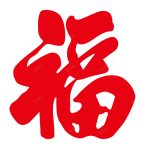The Meaning of Chinese New Year’s ‘Fu’
As Chinese New Year approaches, many may notice this word displayed on festive decorations: 福 (fú). It’s the Chinese word for prosperity or blessing. Sometimes it may appear upside down too! Why? Because in Chinese, “prosperity upside-down” (福倒, fú dào) sounds like “prosperity arrives” (福到, also fú dào).
The Chinese concept of blessing and prosperity
 The Chinese concept of prosperity or blessing is quite focused on monetary wealth and riches. This emphasis can be seen in many aspects of the Chinese New Year celebrations: the welcoming of Caishen, the god of prosperity; the giving of red packets or ang paos containing money to children; and New Year greetings like 恭喜发财 (Gōngxǐ fācái), which literally means, “Congratulations for getting rich!”
The Chinese concept of prosperity or blessing is quite focused on monetary wealth and riches. This emphasis can be seen in many aspects of the Chinese New Year celebrations: the welcoming of Caishen, the god of prosperity; the giving of red packets or ang paos containing money to children; and New Year greetings like 恭喜发财 (Gōngxǐ fācái), which literally means, “Congratulations for getting rich!”
Perhaps, however, a closer look at the word 福 may help us see it from a different perspective. The radical or indexing component of 福 is 礻, which can signify spirituality or God (神, shén). Then on the top right side, we have 一 (yī, “one”) and 口 (kǒu, “mouth”), which together could represent a single mouth or a single person. Lastly, on the bottom right side, we have 田 (tián, “field”), which by association might point to a piece of cultivated land like a garden.
Now, as we turn to God’s Word, can we think of any instances in which one man ( 一 口) was alone with God (礻) in a garden (田)? The first one which comes to mind is in Genesis 2:15, where God, having created Adam, placed him in the Garden of Eden, giving him the responsibility to take care of it.
Turning to God’s Word for true prosperity
And so it arises that true spiritual prosperity or blessedness is exemplified by the perfect and unbroken friendship that Adam enjoyed with God there, before we fell into sin and chose to rebel against God, before we disobeyed His good commands and broke the loving relationship with Him for which He created us.
Another Biblical time and place where these components converge is in the Garden (田) of Gethsemane, where Jesus brought His disciples after the Last Supper (Mark 14:32). He took Peter, James, and John away from the others; and then separated Himself even from those three, his closest friends (Mark 14:33-35), for He wanted to be alone ( 一 口). There, He wrestled with God (礻). In His human weakness, He asked to be spared from the suffering of the Cross; but in the end, He surrendered to God’s will (Mark 14:36).
Now, in that narrative, Jesus does not seem very prosperous or blessed. He was in deep anguish and sorrow (Mark 14:33-34) as he faced the reality of the excruciating death He was going to suffer in a few hours’ time.
Because of Jesus, we can regain spiritual prosperity
However, everything that He suffered in that garden and on the Cross, He suffered for us. In His death, He took the penalty, the punishment for our sins upon Himself, making it possible for us to be friends with God again. Because of Him, we can regain 福 – the spiritual prosperity and blessedness of knowing and loving God, and being known and loved by Him.
So this Chinese New Year, every time we see the word 福, let us remember that “prosperity” and “blessing” is so much more than monetary wealth. Let us give thanks to God for the 福 He has given us in Christ Jesus, and let us live in such a way that our words and deeds will share this good news (福音, fúyīn, “gospel”) with everyone around us. Amen!
WATCH: What is Blessing? (video)
READ: An important reunion dinner awaits us, by C.P. Hia
READ: Chinese New Year can be a fresh start, by Leslie Koh
About the Author
Kiew Sieh Jin is a member of Taman Ujong Methodist Church, where he serves as a lay preacher, worship leader, and Captain of the Boys’ Brigade. He is happily married to Chen May and has two often endearing, sometimes naughty, but always beloved children.
To read other Spotlight Malaysia articles, click below.


